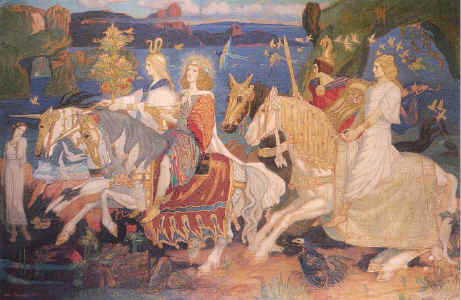
‘On 7th December [1891] I received a letter from Oscar Wilde, saying he had dedicated his new story The Star Child to me’.
So wrote Margot Asquith, socialite and wife of Scottish Liberal M.P. Herbert Asquith, in her autobiography More Memories, which was published in 1933. Her first sighting of Oscar had been at a garden party given by Lady Archibald Campbell and she remembered him as a ‘large, fat, floppy man, in unusual clothes sitting under a fir tree surrounded by admirers’. He was recounting a ‘brilliant monologue’ in which he compared himself to Shakespeare and she felt compelled to join his circle. Afterwards they strolled around Janey Campbell’s lovely gardens and struck up an enduring friendship.
Some time later, during the autumn of 1889, Margot, who was Margot Tennant at the time, invited Oscar to stay at Glen, her family’s country estate. Since he spent most of his time indoors, writing ‘several aphorisms and poems on loose sheets of paper,’ she decided he must dislike the countryside. She thought little of his work and even managed to lose those precious sheets. ‘Speaking for myself’, she confessed, ‘I do not think his stories, plays, or poems will live’. Yet she was pleased when he dedicated ‘The Star Child’ to her.

This cautionary tale, which is included in A House of Pomegranates, appears to borrow from Irish mythology. Two poor woodcutters happen upon a beautiful infant who seems to have fallen from the heavens. The baby grows up to be cruel and haughty but he is redeemed once he passes through a series of trials that force him to acknowledge his wickedness. Wilde’s charmed child possesses qualities that are associated with the Sidhe, a fairy race his mother, Jane, described beautifully in Ancient Legends, Mystic Charms, and Superstitions of Ireland.

Riders of the Sidhe by John Duncan
Wilde’s tales rarely have conventionally happy endings. In this one, the reformed young man becomes a benevolent king but he rules for just three years. His munificence barely impacts on the unequal society he presides over and he is replaced by a series of despots. No good comes of his reign. The moral of Wilde’s story is that no matter how beneficent their ruler, the people will never achieve progress without self-determination. You can read ‘The Star Child’ here.
Margot Asquith was close to the seat of power. Her husband was appointed Home Secretary within months of the publication of A House of Pomegranates and in this role he acted as Wilde’s prosecutor. Margot, who was distantly related by marriage to Lord Alfred Douglas, would have nothing to do with Oscar when he needed her friendship and support.
Sources:
Eleanor Fitzsimons, Wilde’s Women: How Oscar Wilde was Shaped by the Women he Knew (Duckworth, 2015)

Margot Asquith (1933) More Memories (London, Cassells & Company)
Dr. Anne Markey (2011) Oscar Wilde’s Fairy Tales: Origins and Contexts (Irish Academic Press)
